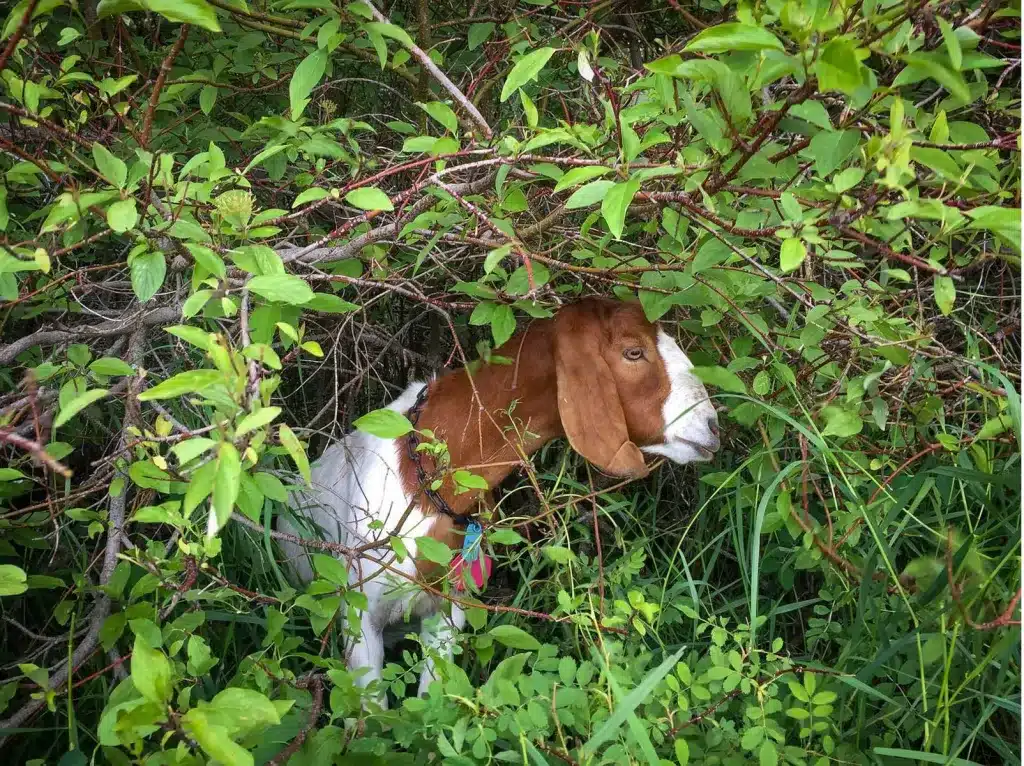Spunky Goats Nourish the Local Food System

“Food is better when it’s loved and respected in its life.”
Joe, the emotionally sensitive guard donkey who watches over the goat herd at Farm 51, receives a spritz of insect repellent to the legs while his owner Jennifer talks to him.

“It’s so hard to be you, Joe, it’s so hard, isn’t it,” she gently teases.
Joe blinks in response. Jennifer Boyer, the owner and co-steward of Farm 51, prepares fencing for a new pasture as we talk under the hot June sun. Her ongoing dialogue with the seventy-five goats and donkey varies between teasing and loving, and the goats nudge or jump on her in response.
“That one there,” she says, pointing to one goat, “she’s the queen of bad ideas.” The goats are mischievous by nature and like testing their fencing as often as they can. Joe, the guard donkey, keeps an eye out for predators, which he scares away by pulling his ears back and charging.

The goats at Farm 51 navigate the landscape with ease, which makes it easy to overlook the fact that they originated in Southwest Asia and Eastern Europe, and not Montana’s grasslands. At Farm 51, they help fill an ecosystem niche as small ruminants that fertilize the soil and break down grass into nutrients. This niche was once filled by bison in a thriving food system of the Indigenous peoples of the Great Plains.

Jennifer and Chris Boyer began raising goats on Farm 51 several years ago for dairy, before transitioning to raising meat goats. For Jennifer, her work with watershed restoration informs her land management practices, and she believes local food can and should co-exist with diverse and healthy ecosystems. Through intensive grazing, which requires farmers to transfer the herd from pasture to pasture using a variable fencing system, Farm 51 ensures that the goats play a supportive role to the native wildlife.

At the height of the COVID-19 pandemic, when communities across Montana experienced food insecurity due to gaps in the food system, Farm 51 collaborated with Soft Landings Missoula to transport goat meat to thirty families. The project–a joint effort that included Amsterdam Meat Shop, AERO, and the Montana Organic Association–involved sending half a goat to each family, so that the meat could be processed in culturally-appropriate ways.
For Jennifer, at the core of her work is the community that is created when local food producers and organizations collaborate to respond to local needs. She says, “The more you can connect at the local level, the more cycling in the community on the economic, social, and ecological level.”
Farm 51 is notable for its emphasis on sharing the vitality of the landscape with the surrounding community and organizations that visit the farm, which includes Big Sky Youth Empowerment Project, Big Brothers Big Sisters, and 4H. Jennifer loves seeing young people connect with the land and the animals that live there.
“Food is better when it’s loved and respected in its life.”
Inevitably, humor is a part of love. She nudges away a stubborn goat blocking the fence as we leave, and says, jokingly, “nobody likes you.”



